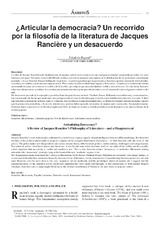Mostrar el registro sencillo del ítem
¿Articular la democracia? Un recorrido por la filosofía de la literatura de Jacques Rancière y un desacuerdo
| dc.contributor.author | Regard, Frédéric | |
| dc.date.accessioned | 2016-12-02T11:20:33Z | |
| dc.date.available | 2016-12-02T11:20:33Z | |
| dc.date.issued | 2016 | |
| dc.identifier.issn | 1575-2100 | |
| dc.identifier.issn | 2386-4494 | |
| dc.identifier.uri | http://hdl.handle.net/10396/14125 | |
| dc.description.abstract | La obra de Jacques Rancière está fundamentada de manera radical en la creencia en una inteligencia original compartida por todos los seres humanos por igual. Por tanto, la tarea del filósofo político consiste en proponer una ruptura de la distribución de las posiciones comúnmente aceptada —lo que Rancière llama el trabajo de «la policía». La policía garantiza que las posiciones y las clases queden claramente diferenciadas; la política, en cambio, cuestiona esta categorización. Pero cuando la policía «distribuye lugares y funciones», se instituye a sí misma del mismo modo también como «un orden de lo visible y de lo decible, que estipula que una actividad sea visible y otra no lo sea». De esta forma Rancière relaciona «democracia» y estética. La escritura modernista articula el principio «democrático» en el corazón del nuevo régimen «estético» del arte. Mi desacuerdo procede de los ejemplos que utiliza Rancière para ilustrar sus tesis: Flaubert, Proust, Mallarmé son nombres muy «consensuales», tan consensuales de hecho que mantienen una jerarquía entre formas de literatura que recuerda a una distribución entre arte y no-arte. Y dado que Rancière considera las noticias como el «síntoma» por excelencia de nuestra modernidad y el objeto privilegiado del arte moderno, sugiero que la prensa sensacionalista, o la novela detectivesca, podrían haber apoyado sus teorías de manera más convincente. Sorprendentemente, Rancière, buen conocedor de la literatura inglesa del XIX, no toma en cuenta la contribución decisiva de Inglaterra a las nuevas formas de la cultura popular. | es_ES |
| dc.description.abstract | Jacques Rancière’s work is thoroughly subtended by a belief in an original, equally shared intelligence between all human beings. It is therefore the duty of the political philosopher to propose a rupture of the accepted distribution of positions – of what Rancière calls the work of ‘the police.’ The police makes sure that positions and classes remain clearly differentiated; politics, on the contrary, challenges such categorization. But when the police ‘distributes places and functions’, it also by the same token institutes itself as ‘an order of the visible and the sayable, which stipulates that an activity is visible and another is not.’ This is how Rancière relates ‘democracy’ to aesthetics. Modernist writing articulates the ‘democratic’ principle lying at the heart of the new ‘aesthetic’ regime of art. My disagreement stems from Rancière’s choice of illustrations for his theses: Flaubert, Proust, Mallarmé are extremely ‘consensual’ names, so consensual in fact that they maintain a hierarchy between forms of literature, stronly reminiscent of a partitioning between art and non-art. And since Rancière sees the news item as the very ‘symptom’ of our modernity and the priviledged object of modern art, I suggest that the sensational press, or the detective novel, could have supported his views more convincingly. A fine connaisseur of 19th-century English literature, Rancière turns a surprizingly blind eye to the distinct contribution of Britain to the new forms of popular culture. | es_ES |
| dc.format.mimetype | application/pdf | es_ES |
| dc.language.iso | spa | es_ES |
| dc.publisher | Asociación de Estudios de Ciencias Sociales y Humanidades | es_ES |
| dc.rights | https://creativecommons.org/licenses/by-nc-nd/4.0/ | es_ES |
| dc.source | Ámbitos (35), 13-19 (2016) | es_ES |
| dc.subject | Rancière | es_ES |
| dc.subject | Modernismo | es_ES |
| dc.subject | Literatura popular | es_ES |
| dc.subject | Novela detectivesca | es_ES |
| dc.subject | Literatura sensacionalista | es_ES |
| dc.subject | Modernism | es_ES |
| dc.subject | Popular Literature | es_ES |
| dc.subject | Detective novel | es_ES |
| dc.subject | Sensational literature | es_ES |
| dc.title | ¿Articular la democracia? Un recorrido por la filosofía de la literatura de Jacques Rancière y un desacuerdo | es_ES |
| dc.title.alternative | Articulating Democracy? A Review of Jacques Rancière’s Philosophy of Literature – and a Disagreement | es_ES |
| dc.type | info:eu-repo/semantics/article | es_ES |
| dc.rights.accessRights | info:eu-repo/semantics/openAccess | es_ES |

